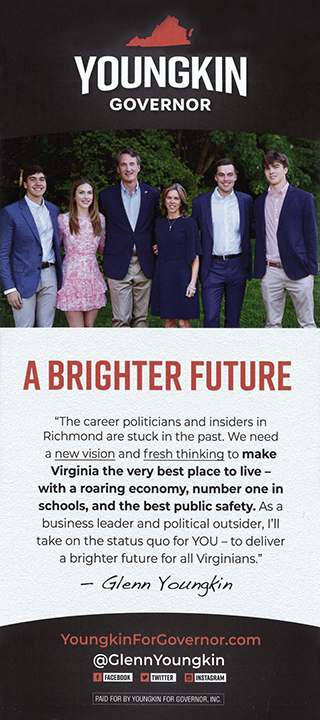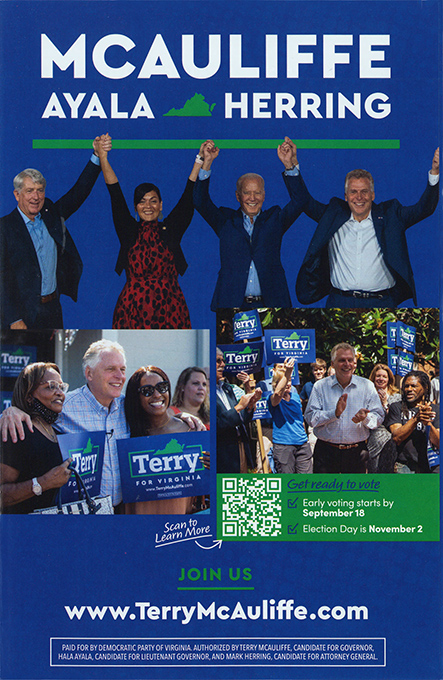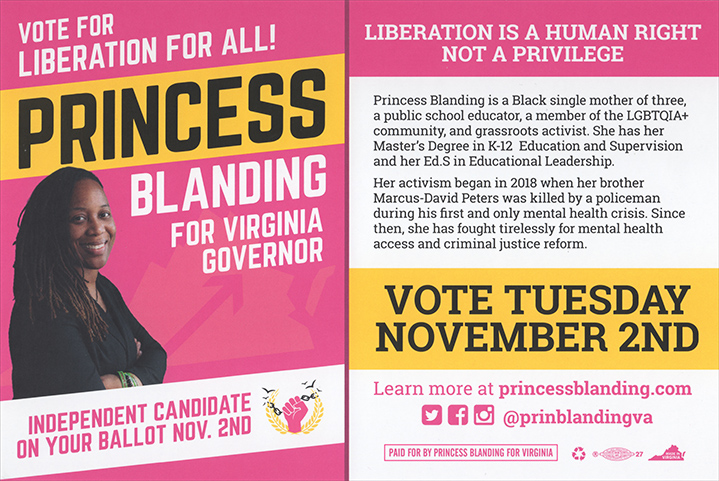- Main
Page « 2021
Governor Races «
Virginia
Governor
| VIRGINIA |
Nov. 2,
2021 Governor |
|
Total
registered: 5,959,692. Total voting:
3,276,572.
VA
Department of Elections
Plurality: 63,688 votes (1.94 percentage points) REPUBLICAN PICK-UP Notes (revised Nov. 3, 2021): Gov. Ralph Northam was term-limited. Former Gov. Terry McAuliffe (D), seeking to return to the governor's office, faced Glenn Youngkin (R), former CEO of The Carlyle Group; also on the ballot was Princess Blanding, a single LGBTQIA+ mother, educator and community activist running as the nominee of the newly formed Liberation Party. The Virginia race was closely watched for early indicators of what to expect in the 2022 midterm elections. McAuliffe, 64, who served as governor from 2014-18 but was term-limited, easily won the June 2021 Democratic primary, garnering 62.1% of the vote against four other candidates including three African Americans. Del. Jennifer D. Carroll Foy, a public defender who resigned her seat to run, finished second (19.8%) followed by state Sen. Jennifer L. McClellan (11.8%), Lt. Gov. Justin E. Fairfax (3.6%) and Lee J. Carter (2.8%). McAuliffe combined an extensive political resume with entrepreneurial experience. His website noted, "He got his start with President Jimmy Carter’s campaign when he was just 23 years old, and later served as co-chair of President Bill Clinton’s 1996 campaign and chairman of the Democratic National Committee and Hillary Clinton’s 2008 presidential campaign." McAuliffe unsuccessfully sought the Democratic nomination for governor in 2009 before being elected in 2013. In Dec. 2017 Governing magazine named him “Public Official of the Year.” Youngkin, 54, had not run for office before. He won the GOP nomination at the state party convention on May 8, 2021, in what the Virginia Republican Party termed "one of the most competitive statewide nominations in Virginia political history." 30,566 delegates participated in the process, which used ranked choice voting. After the first round Youngkin led with 33% followed by entrepreneur Pete Snyder (26%), state Sen. Amanda Chase (21%), Del. Kirk Cox (13%), Sergio de la Pena (6%) and Peter Doran and Octavia Johnson both at less than 1%. Round 6 made Youngkin the winner by 55% to 45% over Chase. Virginia has tilted Democratic in recent elections; both U.S. Senators are Democrats, Democrats control both chambers of the General Assembly, and the Democratic presidential nominee has carried the Commonwealth from 2008 on, including Biden's 10.11 percentage point win over Trump in 2020. However, there were several underlying factors which favored Youngkin. In an off-year, turnout is considerably lower; observers pointed to signs of voter fatigue. Also, as a DNC talking point notes, "The incumbent president’s party has lost the Virginia governor’s race in ten of the previous 11 elections dating back to 1977." National politics had a significant impact in this race. Biden's popularity waned considerably as the campaign progressed, and his disapproval rating exceeded approval from late August (>). The pandemic continued, the administration's handling of the pullout from Afghanistan drew much criticism, and infighting among national Democrats stalled his Build Back Better agenda in Congress. Finally, McAuliffe was running against the retread phenomenon; in recent years a number of attempted political second acts have fallen short at the ballot box as voters seek something new (Senate races of Phil Bredesen (TN) in 2018 and Bayh (IN) and Strickland (OH) in 2016). If he had won, McAuliffe would have been the first person to serve two terms as governor since Mills Godwin, elected as a Democrat in 1965 and eight years later in 1973 as a Republican. A key element of McAuliffe's campaign was appearances by national figures. President Biden campaigned with McAuliffe at Lubber Run Park in Arlington (Northern Virginia) on July 23 and made a second appearance with him on Oct. 26 at Virginia Highlands Park also in Arlington. In addition to Biden, the closing weeks saw a slew of high profile figures campaigning with and for McAuliffe including First Lady Jill Biden, Stacey Abrams, Vice President Kamala Harris and former President Barack Obama. Black turnout was seen as critical to McAuliffe's chances, and many of these visits targeted the black community. On the trail McAuliffe highlighted his accomplishments as governor. He argued that "now is the time to push Virginia forward to build a stronger and fairer post-COVID economy." McAuliffe emphasized his support for reproductive rights, a timely matter since the U.S. Supreme Court is set to consider cases that could affect Roe v. Wade. A core, much repeated element of McAuliffe's campaign was his effort to tie Youngkin to former President Donald Trump. This was a perilous course, for such a tack could easily suck a candidate and campaign into a Trumpian rabblt hole, distracting them from messages more pertinent to voters (+). Youngkin presented himself as an outsider running against career politicians and insiders (read McAuliffe). He offered himself as "a new kind of leader." His website says, "On day one, Glenn will bring to the Governor’s Office 30 years of successful, real-world business experience, to rebuild a better Virginia for everyone who calls it home." In October Youngkin focused on a "parents matter" theme, picking up on a McAuliffe remark in the second debate that, “I don’t think parents should be telling schools what they should teach.” Youngkin cited his opposition to critical race theory, and the argument seemed to have an effect although McAuliffe denounced it as a "racist dogwhistle." He also opposed statewide school mask mandates and called for police ("resource officers") in all Virginia schools. Other major issues Youngkin focused on were crime and cutting taxes. Perhaps Youngkin's greatest challenge was the delicate task of distancing himself from Trump and his false claims while at the same time appealing to Trump supporters. For example, he skipped a conservative "Take Back Virginia" rally on Oct. 13 which featured a call-in from the former president and an appearance by Steve Bannon. The DNC highlighted the awkward dynamic by hiring an airplane banner that asked "Why won't Youngkin let Trump campaign in VA?" Trump held a tele-rally on Election Eve, but Youngkin did not engage in it. Still the two were communicating; the Washington Post reported on Nov. 3 that, "Republican candidate Glenn Youngkin and Trump repeatedly spoke by phone over the course of the campaign." The two major party candidates debated twice, meeting in Grundy on Sept. 16 (>), hosted by the Appalachian School of Law and the Virginia Association of Broadcasters, and at Northern Virginia Community College on Sept. 28 (>), hosted by the Northern Virginia Chamber of Commerce and the Schar School of Policy and Government at George Mason University. Although the third party candidate Princess Blanding was on the ballot, she was not invited to participate in the debates. Blanding disrupted the second debate from her seat in the audience and was escorted out. The long early voting period, which started Sept. 17, provided ample opportunity for the campaigns to turnout unmotivated and low-propensity voters. For much of the general election campaign, polling showed the race was a toss up; McAuliffe appeared slightly ahead, although often within the margin of error (>). As Election Day approached, however, the race tightened. A FOX News poll from late October had Youngkin ahead by eight points, prompting jitters among Democrats. McAuliffe and Youngkin closed their campaigns making final appeals on bus tours and rallies and in ads as they and allies worked to get out the vote (+). In contrast to McAuliffe, Youngkin did not bring in stream of high-profile figures to campaign with him. Yet he appeared to have gained an edge, winning support from independents and drawing larger crowds. The closing trends proved to be accurate indicators of the outcome; Youngkin won by about two percentage points. Republicans' success extended to the candidates for lieutenant governor, Winsome E. Sears, and attorney general, Jason S. Miyares, and to gaining control of the House of Delegates. REACTIONS Campaign Managers: Terry McAuliffe: Chris Bolling Virginia state director on Biden for President, June-Nov. 2020. Executive director of Terry McAuliffe's Common Good VA, Jan.-June 2020. Briefly a senior political advisor to Mike Bloomberg for President, Feb.-Mar. 2020. Executive director of the Democratic Party of Virginia, June 2017-Dec. 2019. Political director on Ralph Northam for Governor, Jan.-Dec. 2017. Organizing director (Mar.-Dec. 2016), deputy executive director (Nov. 2015-Apr. 2016) and Coordinated Campaign director (Mar.-Nov. 2015) at the Democratic Party of Virginia. Regional political director on Friends of Mark Warner, Apr.-Nov. 2014. Regional field director for the Democratic Party of Virginia, Mar.-Nov. 2013. Communications officer for the Richmond Police Department, Sept. 2011-Mar. 2013. National volunteer coordinator for Organizing for America, Mar.-Nov. 2010. Field organizer on VA Victory 2009, Aug.-Nov. 2009; field director on Towey for Delegate, June-Aug. 2009; field organizer on Friends of Terry McAuliffe, 2009. Field organizer on Obama for America, 2008. Studied political science and government at Virginia Commonwealth University and business administration and management at Hampton University. Glenn Youngkin: Garrison Coward Managing director at Merger Partners Incorporated from May 2020; executive director of CPNVA from Jan. 2017. COO of BizCents, Jan. 2019-May 2020. Republican nominee for Virginia House of Delegates District 68 in Nov. 2019. Campaign manager for U.S. Rep. Rob Wittman (VA-1), Mar. 2015-Dec. 2016. Political director (Jan. 2014-Feb. 2015) and deputy director of community engagement (July-Dec. 2013) for the Republican Party of Virginia. Regional voter registration/absentee balloting director for the Republican Party of Virginia, July-Nov. 2012. M.B.A. from The George Washington University School of Business, 2020; Master's degree in political management and public policy from The George Washington University, 2017; B.A. in economics from Hampden-Sydney College, 2012. Princess Blanding: Shannon O'Neill Coordinator and public liaison officer for the Downtown Neighborhood Associate of Richmond from Apr. 2018; writer and editor at Palindrome Creative Co. from May 2017; founder of Settledin from Oct. 2017; and founder of SFO Editorial from May 2010. M.F.A. in creative writing, fiction from Virginia Commonwealth University, 2013; studied at University of Michigan, 1994-97. |
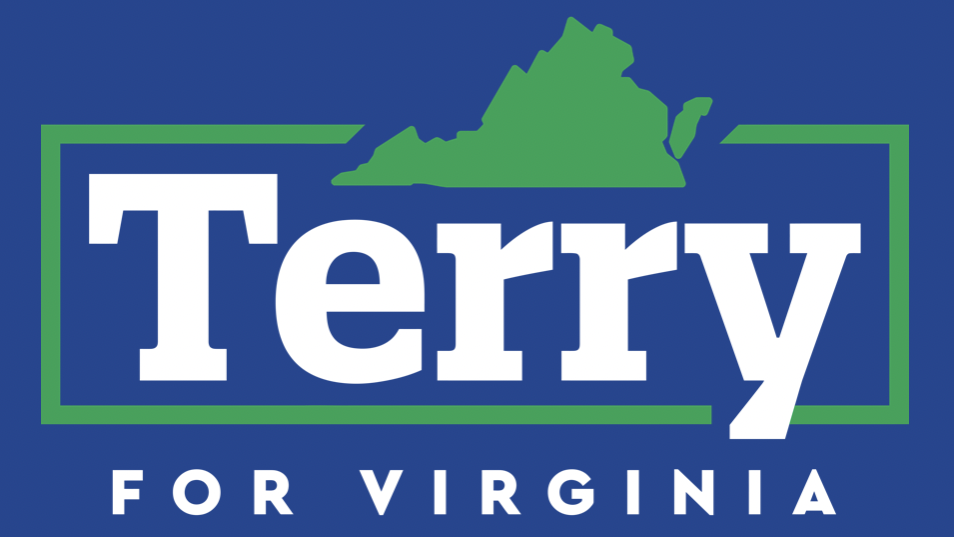 @terrymcauliffe |
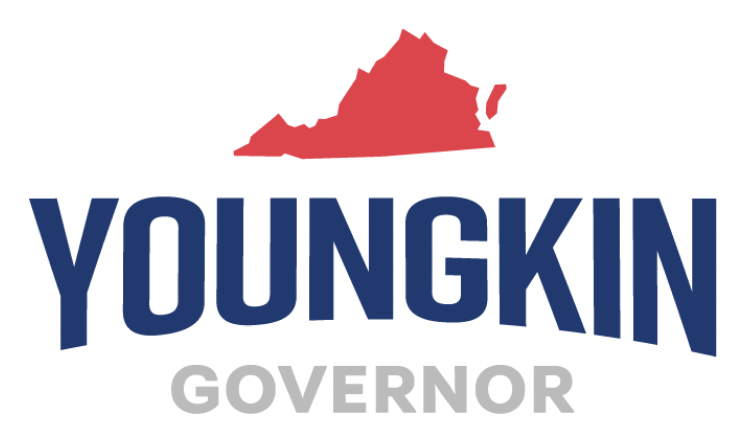 @GlennYoungkin |
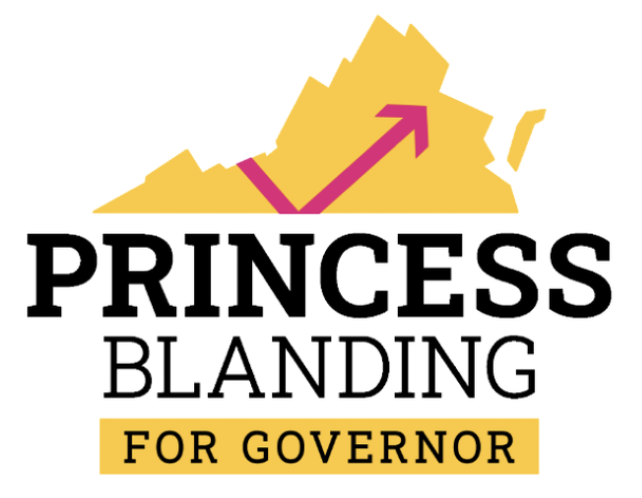 @PrinBlandingVA |
|
ADVERTISEMENT

